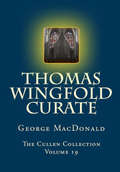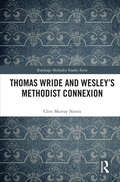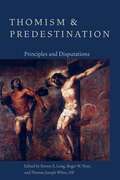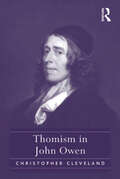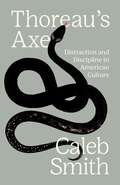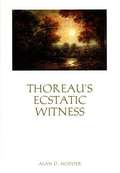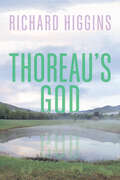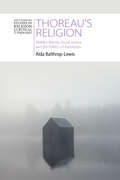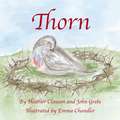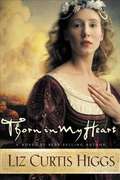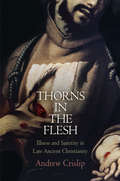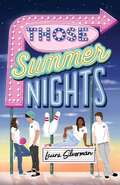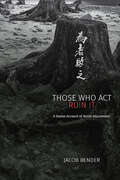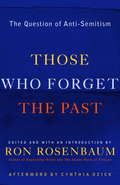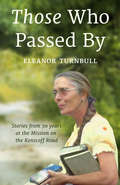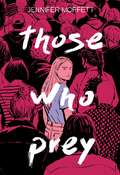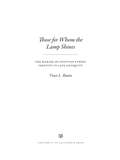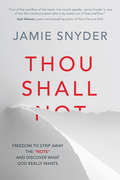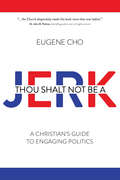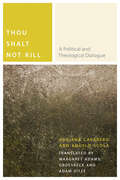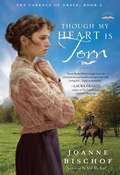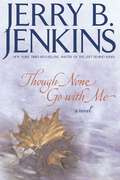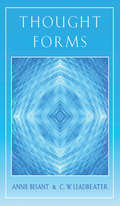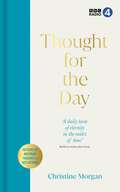- Table View
- List View
Thomas Wingfold Curate (The Cullen Collection #19)
by George MacDonaldA triumphant quest for the truth. First in the Wingfold Trilogy from the 19th-century Scottish author of Paul Faber Surgeon and There and Back. The character of Thomas Wingfold is introduced in this preeminent of George MacDonald&’s English novels, a young curate suddenly brought face-to-face with the hypocrisy of having sought the pulpit as a profession rather than a spiritual calling. Wingfold&’s prayerful journey into faith highlights MacDonald&’s most powerful &“theological novel.&” We also meet the dwarf Joseph Polwarth, Wingfold&’s spiritual mentor and one of MacDonald&’s most memorable humble apologists for truth. The depth and poignancy of Wingfold&’s quest makes this 1876 publication one of MacDonald&’s best-loved works. MacDonald biographer and editor Michael Phillips ranks Thomas Wingfold Curate near the apex of MacDonald&’s corpus, among his personal favorites along with Malcolm, Sir Gibbie, and Donal Grant.
Thomas Wride and Wesley’s Methodist Connexion (Routledge Methodist Studies Series)
by Clive Murray NorrisThis book highlights the life and writings of an itinerant preacher in John Wesley’s Methodist Connexion, Thomas Wride (1733-1807). Detailed studies of such rank and file preachers are rare, as Methodist history has largely been written by and about its leadership. However, Wride’s ministry shows us that the development of this worldwide movement was more complicated and uncertain than many accounts suggest. Wride’s attitude was distinctive. He was no respecter of persons, freely criticising almost everyone he came across, and in doing so exposing debates and tensions within both Methodism and wider society. However, being so combative also led him into conflict with the very movement he sought to promote. Wride is an authentic, self-educated, and non-élite voice that illuminates important features of Eighteenth-Century life well beyond his religious activities. He sheds light on his contemporaries’ attitudes to issues such as the role of women, attitudes towards and the practice of medicine, and the experience and interpretation of dreams and supernatural occurrences. This is a detailed insight into the everyday reality of being an Eighteenth-Century Methodist minister. As such, this text will be of interest to academics working in Methodist Studies and Religious History, as well as Eighteenth-Century History more generally.
Thomism And Predestination: Principles And Disputations
by Thomas Joseph White Steven A. Long Roger W. NuttThere is perhaps no aspect of traditional Thomistic thought so contested in modern Catholic theology as the notion of predestination as presented by the classical Thomist school. What is that doctrine, and why is it so controversial? Has it been rightly understood in the context of modern debates? At the same time, the Church's traditional affirmation of a mystery of predestination is largely ignored in modern Catholic theology more generally. Why is this the case? Can a theology that emphasizes the Augustinian notion of the primacy of salvation by grace alone also forego a theology of predestination? Thomism and Predestination: Principles and Disputations considers these topics from various angles: the principles of the classical Thomistic treatment of predestination, their contested interpretation among modern theologians, examples of the doctrine as illustrated by the spiritual writings of the saints, and the challenges to Catholic theology that the Thomistic tradition continues to pose. This volume initiates readers―especially future theologians and Catholic intellectuals―to a central theme of theology that is speculatively challenging and deeply interconnected to many other elements of the faith.
Thomism in John Owen
by Christopher ClevelandExamining the influence of Thomas Aquinas and his followers upon the seventeenth century Puritan theologian John Owen, this book breaks new ground in exploring the impact of medieval thought upon Reformed scholasticism. Cleveland argues that Owen uses Thomistic ideas in two ways: first in an Augustinian fashion arguing against Pelagian and semi-Pelagian ideas of human independency; second in a Trinitarian fashion, with Thomistic ideas affecting the understanding of each person of the Trinity. The resulting theological formulation is strongly Western and Orthodox and provides a helpful model for theological formulation seeking to build upon a Western Christian foundation. The works of the Reformed theologian John Owen have long been admired for their depth and theological sophistication. In this book Cleveland fills a significant gap in Owen studies by pursuing a deeper understanding of the role that Thomas Aquinas and the school of thought known as Thomism played in Owen's theology, from his works on providence and salvation by the Holy Spirit to his Christological work.
Thoreau's Axe: Distraction and Discipline in American Culture
by Caleb SmithHow nineteenth-century “disciplines of attention” anticipated the contemporary concern with mindfulness and being “spiritual but not religious”Today, we’re driven to distraction, our attention overwhelmed by the many demands upon it—most of which emanate from our beeping and blinking digital devices. This may seem like a decidedly twenty-first-century problem, but, as Caleb Smith shows in this elegantly written, meditative work, distraction was also a serious concern in American culture two centuries ago. In Thoreau’s Axe, Smith explores the strange, beautiful archives of the nineteenth-century attention revival—from a Protestant minister’s warning against frivolous thoughts to Thoreau’s reflections on wakefulness at Walden Pond. Smith examines how Americans came to embrace attention, mindfulness, and other ways of being “spiritual but not religious,” and how older Christian ideas about temptation and spiritual devotion endure in our modern ideas about distraction and attention.Smith explains that nineteenth-century worries over attention developed in response to what were seen as the damaging mental effects of new technologies and economic systems. A “wandering mind,” once diagnosed, was in need of therapy or rehabilitation. Modeling his text after nineteenth-century books of devotion, Smith offers close readings of twenty-eight short passages about attention. Considering social reformers who designed moral training for the masses, religious leaders who organized Christian revivals, and spiritual seekers like Thoreau who experimented with regimens of simplified living and transcendental mysticism, Smith shows how disciplines of attention became the spiritual exercises of a distracted age.
Thoreau's Ecstatic Witness
by Alan D. Hodder"When Henry David Thoreau died in 1862, friends and admirers remembered him as an eccentric man whose outer life was continuously fed by deeper spiritual currents. But scholars have since focused almost exclusively on Thoreau's literary, political, and scientific contributions. This book offers the first in-depth study of Thoreau's religious thought and experience. In it Alan D. Hodder recovers the lost spiritual dimension of the writer's life, revealing a deeply religious man who, despite his rejection of organized religion, possessed a rich inner life, characterized by a sort of personal, experiential, nature-centered, and eclectic spirituality that finds wider expression in America today. " "At the heart of Thoreau's life were episodes of exhilaration in nature that he commonly referred to as his ecstasies. Hodder explores these representations of ecstasy throughout Thoreau's writings - from the riverside reflections of his first book through Walden and the later journals, when he conceived his journal writing as a spiritual discipline in itself and a kind of forum in which to cultivate experiences of contemplative non-attachment. In doing so, Hodder restores to our understanding the deeper spiritual dimension of Thoreau's life to which his writings everywhere bear witness. "--BOOK JACKET. Title Summary field provided by Blackwell North America, Inc. All Rights Reserved
Thoreau's God
by Richard HigginsMeditative reflections on the great spiritual seeker’s deeply felt experience of the divine. Henry David Thoreau’s spiritual life is a riddle. Thoreau’s passionate critique of formal religion is matched only by his rapturous descriptions of encounters with the divine in nature. He fled the church only to pursue a deeper communion with a presence he felt at the heart of the universe. He called this illimitable presence many names, but he often called it God. In Thoreau’s God, Richard Higgins invites seekers—religious or otherwise—to walk with the great Transcendentalist through a series of meditations on his spiritual life. Thoreau offers us no creed, but his writings encourage reflection on how to live, what to notice, and what to love. Though his quest was deeply personal, Thoreau devoted his life to communicating his experience of an infinite, wild, life-giving God. By recovering this vital thread in Thoreau’s life and work, Thoreau’s God opens the door to a new understanding of an original voice in American religion that speaks to spiritual seekers today.
Thoreau's Religion: Walden Woods, Social Justice, and the Politics of Asceticism (New Cambridge Studies in Religion and Critical Thought)
by Alda Balthrop-LewisThoreau's Religion presents a ground-breaking interpretation of Henry David Thoreau's most famous book, Walden. Rather than treating Walden Woods as a lonely wilderness, Balthrop-Lewis demonstrates that Thoreau's ascetic life was a form of religious practice dedicated to cultivating a just, multispecies community. The book makes an important contribution to scholarship in religious studies, political theory, English, environmental studies, and critical theory by offering the first sustained reading of Thoreau's religiously motivated politics. In Balthrop-Lewis's vision, practices of renunciation like Thoreau's can contribute to the reformation of social and political life. In this, the book transforms Thoreau's image, making him a vital source for a world beset by inequality and climate change. Balthrop-Lewis argues for an environmental politics in which ecological flourishing is impossible without economic and social justice.
Thorn
by John Grebe Emma Chandler Heather ClausonThorn is a bird’s-eye view of Jesus’s last week on Earth — from the triumphal entry into Jerusalem, to the death and resurrection of Christ. <P><P>Thorn adds her songs to the shouts of praise of the crowd gathered on the street as Jesus rides into Jerusalem on a donkey, and she sings songs of comfort to Jesus as he dies on the cross. <P><P>During the week, Thorn has several unique encounters with Jesus and is protected in a surprising way when threatened by a sand cat. Throughout the week, Thorn experiences personal transformation and learns to appreciate a special blessing that is passed on to her babies.
Thorn in My Heart
by Liz Curtis HiggsTwo brothers fight to claim one father’s blessing. Two sisters long to claim one man’s heart. In the autumn of 1788, amid the moors and glens of the Scottish Lowlands, two brothers and two sisters each embark on a painful journey of discovery. Jamie and Evan McKie both want their father Alec’s flocks and lands, yet only one brother will inherit Glentrool. Leana and Rose McBride both yearn to catch the eye of the same handsome lad, yet only one sister will be his bride. A thorny love triangle emerges, plagued by lies and deception, jealousy and desire, hidden secrets and broken promises. Brimming with passion and drama,Thorn in My Heartbrings the past to vibrant life, revealing spiritual truths that transcend time and penetrate the deepest places of the heart. From the Trade Paperback edition.
Thorns in the Flesh
by Andrew CrislipThe literature of late ancient Christianity is rich both in saints who lead lives of almost Edenic health and in saints who court and endure horrifying diseases. In such narratives, health and illness might signify the sanctity of the ascetic, or invite consideration of a broader theology of illness. In Thorns in the Flesh, Andrew Crislip draws on a wide range of texts from the fourth through sixth centuries that reflect persistent and contentious attempts to make sense of the illness of the ostensibly holy. These sources include Lives of Antony, Paul, Pachomius, and others; theological treatises by Basil of Caesarea and Evagrius of Pontus; and collections of correspondence from the period such as the Letters of Barsanuphius and John.Through close readings of these texts, Crislip shows how late ancient Christians complicated and critiqued hagiographical commonplaces and radically reinterpreted illness as a valuable mode for spiritual and ascetic practice. Illness need not point to sin or failure, he demonstrates, but might serve in itself as a potent form of spiritual practice that surpasses even the most strenuous of ascetic labors and opens up the sufferer to a more direct knowledge of the self and the divine. Crislip provides a fresh and nuanced look at the contentious and dynamic theology of illness that emerged in and around the ascetic and monastic cultures of the later Roman world.
Those Summer Nights
by Laura SilvermanAfter recovering from a life-changing injury, a teen girl must navigate a new summer job, an ex-best friend, and two surprisingly attractive coworkers in this romp of a rom-com for fans of Jenny Han and Siobhan Vivian.Hannah used to be all about focus, back before she shattered her ankle and her Olympic dreams in one bad soccer play. These days, she&’s all about distraction—anything to keep the painful memories of her recent past at bay, including the string of bad decisions that landed her at boarding school for a year. Enter Bonanza, the local entertainment multiplex and site of Hanna&’s summer employment. With its mini golf course, bowling alley, and arcade—not to mention her hot, flirty coworker Patrick—Bonanza seems like the perfect way to stay distracted. Until her boss announces the annual Bonanza tournament, a staff competition that brings her past Olympic nightmares crashing back into her present. On top of that, the Bonanza staff includes Brie, the ex-best friend she cut off last year, and Ethan, her brother&’s best friend who became unreasonably attractive in her year away and who accepts her, even knowing her worst secrets. Under the neon lights of Bonanza, Hannah must decide whether she can find a way to discover a new self in the midst of her old life.
Those Who Act Ruin It: A Daoist Account of Moral Attunement (SUNY series in Chinese Philosophy and Culture)
by Jacob BenderDrawing on both western and Chinese philosophy, Those Who Act Ruin It shows how Daoism presents a viable alternative to established moral theories. The Daoist, critical of the Confucian and Mohist discourses of their time, provides an account of morality that can best be understood as achieving an attunement to situations through the cultivation of habits. Furthermore, Daoism's meta-ethical insights outline how moral philosophy, when theorized in a way that ignores our fundamental interdependence, devolves into moralistic narcissism. Another way of putting this, as the Daodejing states perfectly, is that "those who act ruin it" (為者敗之). Sensitive to this problem, the Daoist account of moral attunement can ameliorate social woes and not "ruin things." In their moral attunement, Daoists can spontaneously respond to situations in ways that are sensitive to the underlying interdependence of all things.
Those Who Forget the Past: The Question of Anti-Semitism
by Ron RosenbaumSomething has changed. After the horrors of World War II, people everywhere believed that it could never happen again, but today the evidence is unmistakable that anti-Semitism is dramatically on the rise once more. The torching of European synagogues, suicide terror in Israel, the relentless comparison of the Israelis to Nazis, the paranoid post-September 11 Internet-bred conspiracy theories, the Holocaust-denial literature spreading throughout the Arab world, the calumny and violence erupting on American college campuses: Suddenly, a new anti-Semitism has become widespread, even acceptable to some. In this chilling and important new book, Ron Rosenbaum, author of the highly praised Explaining Hitler, brings together a collection of powerful essays about the origin and nature of the new anti-Semitism. Paul Berman, Marie Brenner, David Brooks, Harold Evans, Todd Gitlin, Jeffrey Goldberg, Bernard Lewis, David Mamet, Amos Oz, Cynthia Ozick, Frank Rich, Jonathan Rosen, Edward Said, Judith Shulevitz, Lawrence Summers, Jeffrey Toobin, and Robert Wistrich are among the distinguished writers and intellectuals who grapple with painful questions: Why now? What is--or isn't--new? Is a second Holocaust possible, this time in the Middle East? How does anti-Semitism differ from anti-Zionism? These are issues too dangerous to ignore, too pressing to deny. Those Who Forget the Past is an essential volume for understanding the new bigotry of the twenty-first century. From the Trade Paperback edition.
Those Who Passed By
by Laura Brown Eleanor TurnbullIn Those Who Passed By, veteran missionary Eleanor Turnbull traces the story of Haiti’s development by what happens along the Kenscoff Road and those who travel its bumps and curves.Throughout her nearly 70 years working in development and rural medical care, Eleanor met countless men and women who were just “passing by.” She soon learned that many of them had been “sent” for a greater purpose. Some came for research, others to find themselves; a wise few sought to widen their worldview. Each of them left an indelible mark on Haiti and her people. These are their stories.
Those Who Prey
by Jennifer MoffettSadie meets The Girls in this riveting debut psychological thriller about a lonely college freshman seduced into joining a cult—and her desperate attempt to escape before it&’s too late. College life isn&’t what Emily expected. She expected to spend freshman year strolling through the ivy-covered campus with new friends, finally feeling like she belonged. Instead, she walks the campus alone, still not having found her place or her people so far away from home. But then the Kingdom finds her. The Kingdom, an exclusive on-campus group, offers everything Emily expected out of college and more: acceptance, friends, a potential boyfriend, and a chance to spend the summer on a mission trip to Italy. But the trip is not what she thought it would be. Emily and the others are stripped of their passports and money. They&’re cut off from their families back home. The Kingdom&’s practices become increasingly manipulative and dangerous… And someone ends up dead.
Those for Whom the Lamp Shines: The Making of Egyptian Ethnic Identity in Late Antiquity
by Vince L. BantuIn Those for Whom the Lamp Shines, Vince L. Bantu uses the rich body of anti-Chalcedonian literature to explore how the peoples of Egypt, both inside and outside the Coptic Church, came to understand their identity as Egyptians. Working across a comparative spectrum of traditions and communities in late antiquity, at the intersection of religious and other social forms of identity, Bantu shows that it was the dissenting doctrines of the Coptic Church that played the crucial role in conceptualizing Egypt and being Egyptian. Based on the study of neglected Coptic and Syriac texts, Those for Whom the Lamp Shines offers the only sustained treatment of ethnic and religious self-understanding in Africa’s oldest Christian church.
Thou Shall
by Jamie SnyderTHOU SHALL NOT. The Ten Commandments are vital pillars of Christianity, but building a life entirely on not doing leaves much of God's purpose for your life undone. A fresh look at the Bible reveals significantly more "Thou Shall" callings from God than "Thou Shall Not" directives. A vibrant Christian life is far more about active faith than passive avoidance of sin. The biblical God is defined by movement and action. Jesus's life teaches engagement, sacrifice, and service. God calls us to go, act, advocate, and serve. THOU SHALL.
Thou Shalt Not Be a Jerk: A Christian's Guide to Engaging Politics
by Eugene ChoAccording to Eugene Cho, Christians should never profess blind loyalty to a party. Any party. But they should engage with politics, because politics inform policies which impact people. In Thou Shalt Not Be a Jerk: A Christian&’s Guide to Engaging Politics, Cho encourages readers to remember that hope arrived—not in a politician, system, or great nation—but in the person of Jesus Christ. With determination and heart, Cho urges readers to stop vilifying those they disagree with—especially the vulnerable—and asks Christians to follow Jesus and reflect His teachings. In this book that integrates the pastoral, prophetic, practical, and personal, readers will be inspired to stay engaged, have integrity, listen to the hurting, and vote their convictions.&“When we stay in the Scriptures, pray for wisdom, and advocate for the vulnerable, our love for politics, ideology, philosophy, or even theology, stop superseding our love for God and neighbor.&”
Thou Shalt Not Kill: A Political and Theological Dialogue (Commonalities)
by Adriana Cavarero Angelo ScolaIn this fascinating and rare little book, a leading Italian feminist philosopher and the Archbishop of Milan face off over the contemporary meaning of the biblical commandment not to kill.The result is a series of erudite and wide-ranging arguments that move from murder and suicide to just war and drone strikes, from bioethics and biopolitics to hermeneutics and philology, from Theodor Adorno and Max Horkheimer to Hannah Arendt and Michel Foucault, from Torah and Scripture to art and literature, from the essence of human dignity and the paradoxes of fratricide to engagements with Levinasian ethics.Less a direct debate than a disputation in the classical sense, Thou Shalt Not Kill proves to be a searching meditation on one of the unstated moral premises shared by otherwise bitterly opposed political factions. It will stimulate the mind of the novice while also reminding more advanced readers of the necessity and desirability of thinking in the present.
Though Bombs May Fall: The Extraordinary Story of George Rue, Missionary Doctor to Korea
by Penny Young Sook Kim Charles Mills Richard A. SchaeferAn inspirational story of tenacity and self-sacrifice. Though Bombs May Fall is the extraordinary story of George Henry Rue, a Seventh-day Adventist missionary doctor who left a lucrative medical practice in the U.S. to serve the Korean people during the war years. It is a story that takes you into the heart of a beautiful land during its darkest days, revealing the lives of many determined individuals who wrenched success from tragedy. As you read about Dr. Rue's commitment to serve the people he loved while landmines, bombs, theft, and devastation repeatedly threatened his life, your own faith will deepen. The amazing witness of Dr. Rue inspires us all to stand strong for a God more powerful than bombs, armies, or ideologies.
Though My Heart Is Torn: The Cadence of Grace, Book 2 (The Cadence of Grace #2)
by Joanne BischofGideon O'Riley has two wives--but he doesn't know it. Settling into a simple life in the majestic Blue Ridge mountains, Lonnie and Gideon O'Riley have finally found happiness after the rocky start to their marriage. The roguish bluegrass musician has fallen in love with his gentle wife and the God she serves, and Lonnie rests secure in his tenderness for her and their young son. A heartless ruse interupts their peace, bringing them back to Rocky Knob--and forces them to face the claims of Cassie Allan, a woman who says she is Gideon's rightful wife. As Gideon wades into the depths of his past choices, Lonnie is stunned by the revelations. She has no choice but to navigate this new path, knowing that surviving the devastating blow will take every ounce of strength she has. While Gideon's guilt and his bitterness towards Cassie threatens to burn up his fledgling faith, Lonnie wrestles to find the courage to trust the God who brought them together in the first place. Will their hard-earned love be able to conquer all? Lonnie only wanted her husband's love. Now that he belongs to another, can she surrender Gideon to a God with a bigger plan?
Though None Go with Me: A Novel
by Jerry B. JenkinsThough None Go with Me is a unique heart-warming love story of an unforgettable woman and her determination to make her life an experiment in obedience to God. Elisabeth Grace Leroy, born at the turn of the century, wants something more. Then one night as a young teen she finds what her heart has been yearning for. The defining moment in her life comes when she stands and promises to deepen her commitment and follow Christ, no matter the cost. So begins a remarkable journey of resolve, winding through valleys of loss and deserts of testing toward a legacy of faith. Two world wars, the Great Depression, and devastating personal loss form the backdrop for a lifetime of walking with God despite all odds. Though None Go with Me is a powerful novel depicting one courageous woman's determination to stand faithful in all circumstances. It is a moving saga of forgiveness and peace amidst the loves, trials, and joys of an American family. And ultimately, it is a portrait of the far-reaching impact of a life that fully embraces the steadfast promises of God.
Thought Forms
by Annie BesantWhat do ideas look like? This clairvoyant view of the shape, color, and atmospheric effect of mental energy includes black-and-white drawings and color plates to convey a graphic representation of the power of thought.
Thought for the Day: 50 Years of Fascinating Thoughts & Reflections
by Christine Morgan'A daily taste of eternity in the midst of time'BBC Radio 4 staple Thought for the Day has been running for 50 years, aiming to capture the mood of the country and speak to it in a way that reaches people of all faiths and none.Take a tour of half a century of daily reflections from some of our most prominent and insightful thinkers, including Pope Benedict XVI, Desmond Tutu and Mona Siddiqui. Covering our changing attitudes to sexuality, science, politics, national life, international relations and more, Thought for the Day charts the constant evolution of British society from its uniquely timeless perspective.
